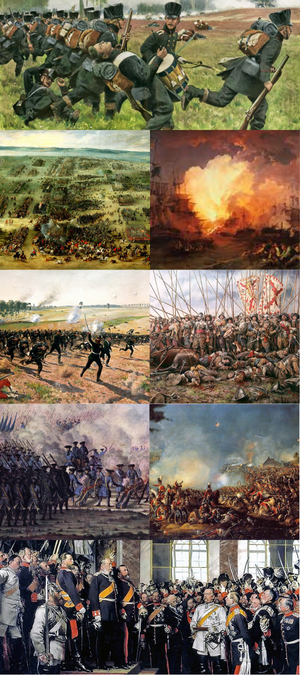Elbonian Wars (Pacifica): Difference between revisions
Weisserstein (talk | contribs) No edit summary |
LordGianni (talk | contribs) mNo edit summary Tag: 2017 source edit |
||
| Line 1: | Line 1: | ||
{{update|reason=Missing categories|date=May 2024}} | |||
{{Infobox military conflict | {{Infobox military conflict | ||
| conflict = Elbonian Wars | | conflict = Elbonian Wars | ||
Revision as of 01:41, 1 May 2024
This article needs to be updated. The reason given is: Missing categories. (May 2024) |
| Elbonian Wars | |||||||
|---|---|---|---|---|---|---|---|
 (clockwise) | |||||||
| |||||||
| Main belligerents | |||||||
|
Continental allies: Anti-piracy operations: |
Elbonian allies: Tzara Elbonian vassals: Yttrian Empire | ||||||
| Commanders and leaders | |||||||
|
|
| ||||||
| Strength | |||||||
|
|
| ||||||
| Z | |||||||
| Casualties and losses | |||||||
|
X killed Y wounded Z captured |
X killed Y wounded Z captured | ||||||
|
X killed Y wounded Z captured | |||||||
The Elbonian Wars, sometimes referred to as the Great Coalition War, the War of the League of Guldenkap, or the Two Hundred Years' War, was a series of military conflicts fought between the Elbonian Empire and its allies against various nations in Cordilia. The roots of the conflict were laid down following Hecklian victory in the Heckel-Cleves War (1564-1568), in which the victorious Lœtviek I proclaimed the formation Elbonian Empire and beginning the period of Elbonian domination, which would last until 1815, when the coalition would put an end to the Elbonian Empire. The wars lasted 247 years, 8 months, and 7 days, making the Elbonian Wars one of the longest conflicts in history.
Upon the unification of Elbonia and the proclamation of the Elbonian Empire, the ambitious Lœtviek I wanted to expand the fledgling empire into a regional power player. This expansionist attitude saw the Elbonian Empire invade and annex many of its neighbors, securing its position in the region, as well as saw rivalries develop with several regional powers, including the Triangular Empire, the Gianlucian Empire in their province of Alemannia, and the Stoinians with their holdings in Cordilia.
Elbonian victories were decisive in cementing Elbonia's regional power, and early on in the war, Elbonia remained undefeated thanks to its early adoption of the arquebus for the infamous Dødskall shock troopers, added with cunning tactics and strategies. At its height, the Elbonian Empire controlled large portions of Central Cordilia, spanning from Moellia to Castemura. However, entering the 17th and 18th century, Elbonian grip on power slowly fell apart as the cost of the wars slowly mounted, burdening the Elbonian economy. Its use of mercenaries and pirates also heavily increased the cost of maintaining the Storhære (Grand Army).
The nail to the coffin of the Elbonian Empire would come in 1806, when it declared war on Lichtenburg-Prussia as retaliation for the latter's involvement and support towards Sunland in the Seventeenth Sunlandic War. This declaration of war would see other nations who were former Gianlucian province of Alemannia join the war in support of Lichtenburg-Prussia, sparking the Weissersteiner-Elbonian War. While the forces of the former Alemannian states didn't change the frontlines at the beginning, the pressure became much worse for the Elbonians with their defeats at Karlsdorf, Kurzweise, and Wien.
The Elbonian Wars would come to an end on 11 November 1815, when the Treaty of Rodenne was signed between the coalition forces and the Elbonian Empire, ending hostilities in the frontlines. The Sundasfall Peace Accords, signed in 1 December 1815, would dismantled the Elbonian Empire, reducing it to the pre-1624 borders. The map of the Elbonian-occupied territories were redrawn by the victorious coalition powers. The end of the war saw the reestablished independence of Yttria, the Moellian and Sugovian states, the unification of Weisserstein, the overthrow of the Theoproprides Dynasty in Thalapadis, the reestablishment of Stoinian control over Castemura, among others. Elbonia would be occupied by a joint coalition of Weisserstein, Riverion-Armonia, Sunland, and Algaria, which established Congress Elbonia.
The Wars had major consequences to the balance of power in the Cordilian continent. The unification of Weisserstein under the House of Lichtenburg-Hohenzollern established a new empire which would play a major part in central Cordilian politics, the beginning of the Concert of Sugovia, the rise of the Rikapadian Dynasty in Thalapadis, and the long-running Elbonian conflict.